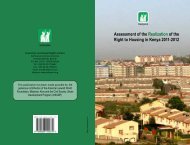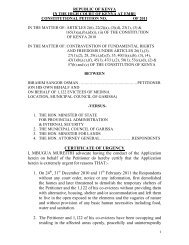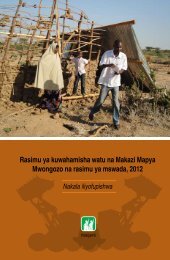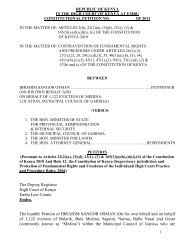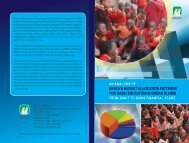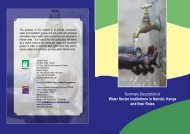Peoples Budget 2010-2011 - Hakijamii
Peoples Budget 2010-2011 - Hakijamii
Peoples Budget 2010-2011 - Hakijamii
You also want an ePaper? Increase the reach of your titles
YUMPU automatically turns print PDFs into web optimized ePapers that Google loves.
<strong>Hakijamii</strong> Trust<br />
Golfcourse Commercial Centre<br />
Kenyatta Market, Nairobi<br />
P O Box 11356, 00100 Nairobi<br />
Tel: +254 (0) 20 2731667<br />
Fax: +254 (0)20 2726023<br />
Email: esrc@hakijamii.com<br />
Web: www.hakijamii.org/kenya<br />
Concern Worldwide<br />
Kalson Towers<br />
5th Floor, Parklands<br />
P.O. Box 13850-00800 Nairobi<br />
Tel: +254 (0) 20 3755051-5<br />
Fax: +254 (0)20 3755056<br />
Email: nairobi.admin@concern.net<br />
Cordaid<br />
P O Box 16440<br />
2500BK The Hague<br />
The Netherlands<br />
Lutherse Burgwal 10<br />
2515 CD The Hague<br />
Tel: +31703136300<br />
This booklet has been printed with support from Concern Worldwide and Cordaid
1<br />
The <strong>Peoples</strong>’ <strong>Budget</strong><br />
<strong>2010</strong>/<strong>2011</strong><br />
Priorities for Action in<br />
Nairobi and Kisumu <strong>Peoples</strong>’ Settlements<br />
25th May <strong>2010</strong><br />
Ufungamano House, Nairobi<br />
Priorities for Action in Nairobi and Kisumu <strong>Peoples</strong>’ Settlements
2<br />
The <strong>Peoples</strong>’ <strong>Budget</strong>, <strong>2010</strong>
3<br />
ABBREVIATIONS & ACRONYMS<br />
ARV Antiretroviral<br />
CBO Community-Based Organization<br />
CDF Constituency Development Fund<br />
FGM Female Genital Mutilation<br />
FPE Free Primary Education<br />
g<br />
gram<br />
GDP Gross Domestic Product<br />
KEBS Kenya Bureau of Standards<br />
kg kilogram<br />
KICOMI Kisumu Cotton Mills<br />
Kshs Kenya Shillings<br />
LASDAP Local Authority Service Delivery Action Plan<br />
ltr litre<br />
ml millilitre<br />
MP Member of Parliament<br />
NCPB National Cereals and Produce Board<br />
NGO Non-Governmental Organization<br />
NPSN Nairobi People’s Settlements Network<br />
PLWHA People Living with HIV/AIDS<br />
/= Shilling<br />
Priorities for Action in Nairobi and Kisumu <strong>Peoples</strong>’ Settlements
4<br />
1.0 INTRODUCTION<br />
Last year, on the 21 st day of May 2009, we presented our third People’s <strong>Budget</strong>. We<br />
were very specific on what we expected the government to prioritize. We appreciate<br />
the efforts made by the government, especially, the decision to withdraw the fuel<br />
guzzlers that were being used by the Ministers and other top government officials<br />
and to introduce small engine cars (Volkswagen Passat). The savings the government<br />
has made must be put into projects that target the grassroot communities.<br />
Another positive move by the government is in the area of allocation of resources<br />
to build schools in each constituency. However, our specific proposal on this was<br />
for the government to build schools in specified settlements to cater for the needs of<br />
children from urban informal settlements. This demand has not yet been fulfilled and<br />
we will give it first priority this year.<br />
The year <strong>2010</strong>, has presented us with another wonderful opportunity in the way<br />
of the proposed constitution, which has articulated a lot of progressive chapters<br />
and clauses on the Bill of Rights. Our clarion call as members of Nairobi People’s<br />
settlements Network and Kutoka Network in partnership with Muungano Wa<br />
Wanavijiji and Kisumu Social Rights, is that the time to realize this change is now,<br />
and we must all come out in large numbers to vote for the proposed constitution.<br />
This is the only chance we have as a generation to decide the nature and type of<br />
constitution that we want for our children and future generations.<br />
We, the voters, must help right the wrong we have lived with for over 45 years;<br />
as this will guarantee us a say in how resources at the lowest level are raised and<br />
used. It is only through our own efforts that we shall be able to institute changes that<br />
will improve our lives and those of our children, our grandchildren and even great<br />
grandchildren.<br />
This year we are putting the government on notice. We shall join forces with all<br />
like- minded individuals and institutions nationally, to ensure that these proposals<br />
are not left out at resource allocation level. We will strive to make sure that the<br />
resources are actually availed by the responsible ministry.<br />
The <strong>Peoples</strong>’ <strong>Budget</strong>, <strong>2010</strong><br />
Theme:<br />
KATIBA NI HAKI YETU<br />
ELIMU NI HAKI YA KIMSINGI<br />
“TUNADAI KATIBA”
5<br />
2.0 OUR KEY PRINCIPLES<br />
The primary responsibility of the government is to respect, protect, promote and<br />
fulfill all human rights of its citizens. To achieve this, government must do a number<br />
of things. These include, enacting of appropriate laws and policies. But above all, it<br />
must provide money and other resources to address the basic needs of its citizens.<br />
A government’s commitment and priorities to fulfill human rights is determined<br />
by how it allocates its resources (national budget). It does not matter how good a<br />
constitution or laws are. Resources must be provided by the government to make<br />
things happen. Every government avails resources through its annual budget. That<br />
is why the national budget is very important to us and should be very important to<br />
all the citizens.<br />
It is through the budget that we can tell which areas are most valued by the<br />
government, whose needs are most considered, who it rewards most and who it<br />
does not. It is through the budget that we shall know whether residents of Mathare<br />
or Lavington will or will not get a road, a hospital, water or electricity. It is through<br />
the budget that we shall know whether or not the children of Korogocho will attend<br />
good schools and it is through the budget that we shall tell whether or not the people<br />
of Viwandani will have access to clean water. Only through the budget will we know<br />
whether or not the people of Raila Village will be able to access basic services, and<br />
whether the children of Mathare will die of cholera. In summary, the budget that the<br />
government reads determines who will live in dignity and who will not.<br />
We believe, therefore, that the budget is the most effective tool of improving our<br />
standards of living; so that we will no longer be worried about where our next meal<br />
will come from, whether we will have access to sanitation facilities and where the<br />
children will go to school. That is why we are here today, as we had promised last<br />
year, at the same venue. And that is why we shall be here again next year. We have<br />
a right and an important role to play in the key decisions on the budget process. A<br />
budget can only be good if the process is good. No process is more crucial in our<br />
lives than budget formulation, implementation and monitoring.<br />
Priorities for Action in Nairobi and Kisumu <strong>Peoples</strong>’ Settlements
6<br />
2.1 The Key Principles<br />
This budget is based on the following key principles:<br />
1. That each human being, by virtue of being human, is a holder of rights.<br />
The government has the obligation to respect, protect, promote and fulfill<br />
all these rights. Therefore, the budget must be an instrument for the<br />
progressive allocation of resources towards the protection and fulfillment<br />
of these rights.<br />
2. That the national budget has to substantially cater for and give priority to the<br />
urgent needs of the majority, based on the principles of non-discrimination<br />
and equality.<br />
3. That people have a role to play in the budget process. They have to play an<br />
active role in the budget formulation, implementation and monitoring.<br />
4. That we subscribe to the principles of transparency, accountability and<br />
zero-tolerance to corruption in the management of national and public<br />
affairs, and resources. We believe that to end the culture of corruption and<br />
impunity, we must start the fight from the top. This does not mean that we<br />
will spare the corrupt at lower levels.<br />
5. That levels of spending by the government must be adequate to improve<br />
services to poor communities and stimulate overall economic growth for<br />
the majority of the population, especially women, youth, the disabled and<br />
the elderly.<br />
6. That national planning and budgeting should be managed to make the<br />
formal and informal economy more inclusive, on the one hand by giving<br />
the poor greater access to resources, skills and other services, and on the<br />
other by guiding the economy towards growth, universal wealth creation<br />
and sustainable employment-creating activities.<br />
The <strong>Peoples</strong>’ <strong>Budget</strong>, <strong>2010</strong>
7<br />
3.0 SPECIFIC PROPOSALS<br />
3.1 Revenue<br />
We recommend:<br />
• That the recommendations of the Ndung’u Commission on irregularly<br />
allocated public land alongside other commissions’ recommendations i.e.,<br />
Kriegler and the Waki Commissions, be implemented without any further<br />
delay.<br />
• That top government officials take pay cuts. It has become apparently clear<br />
that the President of Kenya is among the highest paid in the world. However,<br />
this kind of package is not commensurate with the GDP of the country.<br />
Therefore, His Excellency Hon. Mwai Kibaki should lead by example by<br />
reducing his remuneration by 20-30% followed by the Prime Minister, Vice<br />
President, Ministers and all Members of Parliament (MPs).<br />
• That all Kenyans pay taxes. In our last budget we proposed introduction<br />
of taxation for constitutional offices (i.e. MPs and judges). We emphasize<br />
the same and further recommend the immediate enactment of legislation<br />
to specifically provide for the taxation of all Members of Parliament and<br />
judges.<br />
• That the Government take immediate steps to recover all monies obtained<br />
through corruption and those involved be held accountable and face the full<br />
force of the law.<br />
• That all records of vehicles returned by various ministers and their current<br />
values be made public before being auctioned and that the proceeds realized<br />
from the sales be used to finance building of schools in the urban people’s<br />
settlements.<br />
• That the proposed taxation on idle land or undeveloped land be implemented<br />
forthwith.<br />
3.2 Taxation<br />
We propose the following:<br />
• Price control for basic services be introduced and strictly implemented if the<br />
ordinary mwananchi is to survive and, at least, vote in the referendum and<br />
Priorities for Action in Nairobi and Kisumu <strong>Peoples</strong>’ Settlements
8<br />
The prices of basic essential commodities need to be controlled for the poor’s sake<br />
2012 General Elections. The prices of essential commodities produced and<br />
manufactured within the country should be reduced as listed below:<br />
1. Flour 40/= per 2 kg<br />
2. Bread 20/= per 500 g<br />
3. Milk 16/= per 500 ml<br />
4 Sugar 30/= per kg<br />
5. Cooking oil 45/= per ltr<br />
6. Rice 45/= per kg<br />
7. Paraffin 25/= per ltr<br />
8. Petrol 52/= per ltr<br />
9. Salt 10/= per kg<br />
10. Tea leaves 10/= per 50 g<br />
11. Match box 1/= per box of 45 sticks<br />
• That the government speed up with the process of taxation of Members of<br />
Parliament.<br />
• That physically challenged persons be trained on vocational skills and<br />
receive funding to start small businesses.<br />
• That resources be set aside for revamping of collapsed industries such<br />
as KICOMI and Miwani Sugar Company, for the purpose of creating<br />
employment opportunities.<br />
• That opportunities for local investment and entrepreneurship be increased<br />
through provision of low interest loans and subsidies.<br />
• That the government enforces the Employment Act so that employers stop<br />
abuse of casual workers.<br />
The <strong>Peoples</strong>’ <strong>Budget</strong>, <strong>2010</strong>
9<br />
3.3 Land and housing<br />
We recommend:<br />
• That the Ministry of Housing in partnership with the community, private<br />
sector and other non-state actors conduct an audit of the quality and standards<br />
of houses at the decanting site since there are houses which already have<br />
cracks on the walls and the floors, an indication that building standards and<br />
quality were compromised.<br />
• That the Ministry of Finance increase allocations to expand slum-upgrading<br />
programs and to facilitate access to credit and finance for livelihood of<br />
housing improvement by low-income groups and for government to adapt<br />
community contracting, procurement and labour-intensive implementation<br />
methods by engaging more community members in housing and upgrading<br />
projects.<br />
• That the Ministry of Housing liaise with other relevant ministries (e.g. Local<br />
Government) to acquire land with security of tenure for developing human<br />
settlements, especially in the people’’s settlement and to ensure that all<br />
genuine residents benefit from the initiative.<br />
• That at least 12% of government revenue be allocated to development of low<br />
cost housing in the people’s settlement across Kenya every year, and that rent<br />
restriction in these settlements be put in place. We recommend that a house<br />
of 10x10 feet, iron sheet roofed and plastered with water and sanitation and<br />
electricity services be charged at the rate of Kshs. 500 per month.<br />
• That the Ministry of Housing make public all the names of people currently<br />
residing in the decanting site for Kibera Soweto residents to verify genuine<br />
tenants since there are cases of alleged corruption both from the ministry and<br />
community leaders.<br />
• That the government set aside funds to purchase land for the settlement of<br />
the people in the following areas: Lenana (Dagorreti), Mukuru Kayaba and<br />
Lunga Lunga (Makadara), Mukuru kwa Reuben and Mukuru Kwa Njenga,<br />
Maili Saba/Mwengenya, Jada/Kanguruwe and Kwa Mola all in Embakasi.<br />
Money from the same kit should be used to process and issue title deeds<br />
to communities in the following settlements: Kibagare, Dam, Kaptagat,<br />
Priorities for Action in Nairobi and Kisumu <strong>Peoples</strong>’ Settlements
10<br />
NITD, Kangemi, Kitusuru (Westlands); Kibera and Mitumba (Lang’ata);<br />
Korogocho (Kasarani), Kosovo, Muoroto, Mathare 3C, Mashimoni, Thayu<br />
and all IDP camps. All these settlements are on public land and there is no<br />
reason why the residents should continue staying there without security of<br />
tenure.<br />
3.4 Water and sanitation<br />
This year, <strong>2010</strong>/<strong>2011</strong>, in addition to last year’s proposals, we are further<br />
recommending the following:<br />
• That dumping sites be demarcated and allocated in the people’s settlements<br />
by the city council and garbage trucks assigned to collect garbage.<br />
• That proper drainage be constructed for draining storm and waste water thus<br />
reducing the risk of contracting malaria, bilharzia, and other diseases caused<br />
by stagnant and/or dirty water.<br />
• That the Nairobi Water and Sewerage Company, Informal Settlement<br />
Department institutionalize and implement more stringent control over<br />
the prices at the water kiosks in the settlements. We are aware that the<br />
recommended price is Kshs 2 for every 20 litres. However, most residents in<br />
the settlements pay much more.<br />
• That regarding the social connection policy, we propose that in addition to<br />
the funds set aside by the water company, which will provide a subsidy<br />
for connections for the people in the settlements; that the policy includes a<br />
provision for a staggered payment schedule. This will cater for those who<br />
may not be able to raise the money at once.<br />
• That the service provider put in place mechanisms to ensure provision of<br />
minimum amounts of free water of 20 litres per day per person.<br />
• That boreholes in Dagoretti be upgraded and more constructed to deal with<br />
water shortages in the following places: Ng’ando village, Riruta – village<br />
and Lenana-Mtego village.<br />
The <strong>Peoples</strong>’ <strong>Budget</strong>, <strong>2010</strong>
11<br />
3.5 Health<br />
We want to reiterate our proposals for the year 2009/<strong>2010</strong> which were not<br />
given priority by the government. We still expect that the government will take<br />
responsibility and recommend:<br />
• That government provide comprehensive support to people living with HIV/<br />
AIDS (PLWHAs) and provide level two ARVs which should be extended<br />
to the rural areas. The government should also invest in nutritious foods for<br />
PLWHAs.<br />
• That the government look into the construction of well-equipped dispensaries<br />
with maternity wings in the people’s settlements to reduce the high maternal<br />
and infant mortality rate.<br />
• That sanitary towels be provided for free to school children to help retain<br />
girls in school.<br />
• That the government combat gender-based violence and finance gendersensitive<br />
awareness programs against FGM and forced circumcision for<br />
males.<br />
• That in partnership with private sector and non-governmental organizations<br />
(NGOs), the government conduct periodic health surveys at the household<br />
level.<br />
• That the cost of sanitary towels be reduced to Kshs 20 for 10 pieces.<br />
3.6 Infrastructure<br />
We do hereby propose that:<br />
• Fire stations be decentralized to each of Nairobi’s eight and Kisumu’s three<br />
constituencies.<br />
• Electricity be provided by the government to the people’s settlements under<br />
terms similar to the rural electrification program where the rates are not as<br />
costly.<br />
• The government construct at least one fire point equipped with modern fire<br />
fighting machines in each of the people’s settlements to combat the common<br />
fires.<br />
• The government build more railway lines to enhance sufficient transportation<br />
Priorities for Action in Nairobi and Kisumu <strong>Peoples</strong>’ Settlements
12<br />
•<br />
by commuter trains and ease traffic in the city center.<br />
Current contracting procedures and regulations be reviewed to provide for<br />
community contracting of infrastructure works.<br />
3.7 Education<br />
We recommend that to be able to realize universal Free Primary Education (FPE),<br />
the government must consider doing the following:<br />
• Setting aside funds for the construction and equipping of primary and<br />
secondary schools in the people’s settlements. Resources should be allocated<br />
towards this and necessary support be given to teachers.<br />
• Allocating funds to expand existing public schools that serve the slum<br />
communities since the facilities in these schools are overstretched. For<br />
example, Kibera slum is only served by three public primary schools despite<br />
its large population.<br />
• Allocating resources to cater for children with special needs, such as the<br />
provision of specialized teachers, specialized equipment, learning and<br />
teaching materials as well as special diets for children with special needs.<br />
• Providing trained teachers to non-formal schools which are currently served<br />
by untrained teachers since these institutions cannot afford to pay trained<br />
teachers, thereby compromising the quality of education provided within<br />
the slums.<br />
• Introducing feeding programs in all schools in the people’s settlements.<br />
Specifically, we are therefore recommending that, beginning next financial year<br />
(<strong>2010</strong>/<strong>2011</strong>), the government should set aside funds to construct public primary<br />
schools in the following areas;<br />
• Lang’ata: at least one primary and one secondary school in each ward<br />
• Westlands: at least one public school in each ward<br />
• Kasarani: upgrade existing schools to adequate standards and construct new<br />
schools in each ward<br />
• Makadara: at least one primary and one secondary public school in each ward<br />
• Dagoretti: government to build two public schools (Ng’ndo village, Ngando<br />
ward, Mtego village Riruta ward)<br />
The <strong>Peoples</strong>’ <strong>Budget</strong>, <strong>2010</strong>
13<br />
•<br />
•<br />
•<br />
Starehe: one secondary school to be constructed<br />
Mathare: one primary school in each ward<br />
Kamukunji: one primary and one secondary school in each ward.<br />
In Kisumu, primary schools should be built in Obunga, Manyatta A and Bandani.<br />
To enhance the quality of education, more funds should be made available to recruit<br />
teachers and buy necessary books and equipment.<br />
3.8 Security and safety<br />
Security and safety are serious problems in the informal settlements. We are<br />
recommending that each informal settlement should have a police post. Resources<br />
should be set aside to re-launch community policing with active participation of the<br />
people.<br />
The government should fund popular community-based organizations (CBOs)<br />
to spearhead community policing and embrace the Kazi kwa Vijana employment<br />
programs which should be a long-term initiative. Specifically, the government<br />
should:<br />
• Ensure that the police are better trained especially in public relations and<br />
in handling informants or witnesses who provide information to them<br />
(confidentiality).<br />
• Fast-track police reforms and initiate civic education programs on security<br />
and human rights to the police.<br />
• Ensure total protection of Kenya’s territory and its citizens to avoid invasion<br />
by neighboring countries and pirates.<br />
• Continue with the improvement of the quality housing for police officers<br />
countrywide.<br />
• Ban all vigilante groups and ensure that corrupt government officials are<br />
fired and prosecuted.<br />
• Put up security lights in volatile areas and along the streets and wards in<br />
Mathare, Kawangware, Westlands and Kasarani.<br />
Priorities for Action in Nairobi and Kisumu <strong>Peoples</strong>’ Settlements
14<br />
3.9 Food security<br />
Kenyans continue to die during the rainy and dry seasons, which is a worrying<br />
situation. This is a clear sign of lack of strategy and preparedness by the government.<br />
Kenyans should not die of hunger or be forced to buy food at exorbitant prices. We<br />
are therefore recommending that the government:<br />
• Increase allocations for national schemes e.g. irrigation schemes and<br />
harvesting of rain water.<br />
• Increase the number of silos for food storage and increase allocation to the<br />
National Cereals and Produce Board (NCPB).<br />
• Put in place systems to deal with influx of products such as milk and also to<br />
deal with cases like the mass death of livestock due to drought and disease.<br />
• Regulate the use of genetically modified organisms in the country.<br />
• Invest in initiatives to mitigate the effects of climate change.<br />
• Through the Kenya Bureau of Standards (KEBS), improve their services to<br />
avoid poor quality products finding their way into the loacal market.<br />
• Continue with the price subsidies on basic commodities such as maize flour<br />
which had been introduced in 2009 to cater for the poor and marginalized.<br />
3.10 Environment<br />
We recommend that the government:<br />
• Facilitate creation of community dumping sites where garbage is collected<br />
regularly.<br />
• Provide appropriate equipment for trash collection e.g. face masks,<br />
gumboots, etc.<br />
• Ban use of polythene bags and re-introduce the gunny bag for garbage<br />
collection in all residential areas.<br />
• Initiate nation-wide tree planting and forestation projects.<br />
• Sensitize communities on the importance and need of sorting trash.<br />
3.11 Economic and social empowerment<br />
We recommend that the government:<br />
• Increase the sports kitty from Kshs 1 million to Kshs 5 million to encourage<br />
The <strong>Peoples</strong>’ <strong>Budget</strong>, <strong>2010</strong>
15<br />
more youth to engage in various sporting activities, and not just football as<br />
is currently the case.<br />
• Hasten the establishment of a National Youth Council .<br />
• Introduce a fund for men to be channeled through the Ministry of Gender or<br />
Provincial Administration.<br />
• Increase the resources currently allocated to the kitty for the elderly.<br />
3.12 Way forward<br />
The National <strong>Budget</strong> tells us what the government is committed to doing, as<br />
opposed to what it says it wants to do or hopes to do. As such we consider our<br />
participation as both a right and a duty. To achieve this we are proposing the following<br />
concrete steps:<br />
1.<br />
2.<br />
3.<br />
4.<br />
5.<br />
That the government set aside funding, from next year, to facilitate community<br />
participation from the village level in the budget process. In addition, the<br />
current sector hearing process, is inadequate since their structures do not<br />
allow for genuine participation. In fact by the time the sector hearings are<br />
being held, key decisions on areas to be funded have already been made and<br />
specific projects selected. Thus the hearings are just meant to rubber-stamp<br />
the proposals.<br />
The Constituency Development Fund (CDF) Act as well as the Local<br />
Authority Service Delivery Action Plan (LASDAP) Act be amended as a<br />
matter of priority to provide for people’s direct representation in the decisionmaking<br />
bodies.<br />
That representative Ward and Constituency <strong>Budget</strong> Committees be created<br />
to act as the vehicle for people’s participation in the budget process and<br />
open public hearing and accountability sessions be conducted in the people’s<br />
settlements six months before the budget is written.<br />
That the budget-making process and final allocation be gender-responsive.<br />
That money already allocated to development should be utilized as planned,<br />
and if allocated sums remain unspent at the end of financial year, the<br />
concerned public officials be prosecuted for economical crimes.<br />
Priorities for Action in Nairobi and Kisumu <strong>Peoples</strong>’ Settlements
16<br />
4.0 PROPOSED LEGAL AND POLICY CHANGES<br />
We are aware that policies and legislations play a key role in complementing the<br />
budget. We therefore wish to make the following recommendations:<br />
1.<br />
2.<br />
3.<br />
4.<br />
5.<br />
6.<br />
7.<br />
8.<br />
That the adequate funds be made available to finalize the Constitution.<br />
That the budget make provision for sufficient funds for the implementation<br />
of the National Land Policy and the Eviction Guidelines. Policy and law<br />
making are primary responsibilities of every government and should be<br />
funded directly from the consolidated funds.<br />
That the budget make special provision to provide for basic education in the<br />
poor urban settlements instead of relying on broad budgetary allocation for<br />
the Ministry of Education.<br />
That adequate funds be set aside in this year’s budget for the development of<br />
a National Slum Upgrading Policy.<br />
That funds be made available to review and implement a new Rent Restriction<br />
Act to protect residents in the people’s settlements from forced evictions.<br />
That the National Health Insurance Bill be re-introduced and passed<br />
immediately to help the low-income communities.<br />
That money be made available to finance a comprehensive study to look at<br />
the possibility of introducing a national social security system that would<br />
cover all vulnerable groups including the elderly, the unemployed and<br />
people with disabilities.<br />
That funds be made available to finalize and implement a new National<br />
Housing Rights law.<br />
The budget should include special provision for basic education in the poor urban settlements<br />
The <strong>Peoples</strong>’ <strong>Budget</strong>, <strong>2010</strong>
17<br />
5.0 CONCLUSION<br />
We will be heading to the polls once again to vote for a new constitution, yet<br />
the post-election crisis is still fresh in our minds. We know that it was an extremely<br />
challenging period for Kenya. The negative impact on the social, economic and<br />
political fabric of the nation was immense. If the current economic recovery continues<br />
Kenya will be a great nation. However, serious commitments have to be made and<br />
followed through with action. There has to be fundamental shift in how national<br />
planning and budgeting is done. This is an opportunity for the government of Kenya<br />
to prove its commitment to the people of this country in the fight against poverty<br />
by allocating resources to the sectors and areas that are more important and that not<br />
only spur economic growth, but also directly benefit the majority of the needy.<br />
The budget is a national issue and is as important as the national elections and<br />
other national events. We urge all our citizens who have been excluded from this<br />
process to now begin to get involved so that we can ensure that this exercise is not<br />
left to a few individuals who do not even understand the interests and needs of the<br />
ordinary people. We intend to extend our people’s budget committees throughout<br />
the country so that we can have a budget by the people, for the people and of the<br />
people!<br />
God Bless Kenya as we prepare to go for<br />
the referendum on the proposed constitution.<br />
A luta continua.<br />
Kibera residents shifting to the decanting site to pave way for better housing. The government should<br />
significantly increase resource allocation to sectors that directly benefit the majority of the needy<br />
Priorities for Action in Nairobi and Kisumu <strong>Peoples</strong>’ Settlements
18<br />
ORGANIZATIONAL PROFILES<br />
KUTOKA NETWORK<br />
The Kutoka Network is a voluntary gathering of Christian teams who minister<br />
to people living in the various informal settlements. The word “kutoka” is a Swahili<br />
term which originates from the biblical meaning, “the Exodus”. The network began<br />
in 2002, when priests, sisters and lay people living and working in parishes linked<br />
up and started to discuss and share the multiple issues they faced in their daily<br />
work, both challenges and achievements, in the slum environment. Together we<br />
look at the problems affecting the people in slums, with the eyes of Gospel.<br />
Our aim and objective<br />
The network aims to analyze the reality of the slums, to share experiences, to<br />
reflect together on the pastoral approach, to plan common initiatives and actions and<br />
to highlight positive aspects of the reality of the communities living in the informal<br />
settlements.<br />
Our hope<br />
We are particularly inspired by the following passages from the Bible:<br />
The spirit of the Lord is on me, for He has anointed me to bring the good news to<br />
the afflicted. He has sent me to proclaim liberty to captives, sight to the blind, to let<br />
the oppressed go free, to proclaim a year of favour from the Lord.<br />
(Isaiah 61: 1-2; Luke 4: 18-19)<br />
The exodus is a common dream, and we believe that:<br />
“If you want to save someone out of sludge and muck, do not cheat yourself you<br />
can remain up there and be pleased to lower a helping hand. All the way down you<br />
must go: inside muck and sludge. There, seize the other, then with strong hands lift<br />
both of you up into the light.”<br />
Rabbi Schlomo in Martin Buber’s Tales of the Hasidim TAKE THE PLUNGE!<br />
The <strong>Peoples</strong>’ <strong>Budget</strong>, <strong>2010</strong>
19<br />
NAIROBI PEOPLE’S SETTLEMENTS NETWORK<br />
The Nairobi People’s Settlements Network (NPSN) is an initiative of community<br />
groups from various people’s settlements within Nairobi (formerly called slums).<br />
The Network was mooted in October 2005, while planning for the celebrations of<br />
December 10th, 2005 World Human Rights Day. The Network was adopted on 10th<br />
December 2005 at St. John’s Catholic Church, Korogocho during the World Human<br />
Rights Day celebrations.<br />
Our Vision<br />
A vibrant just development oriented society<br />
Aim and objectives<br />
The main aim of NPSN was and still is to bring together community groups<br />
engaged in various activities in order to improve effectiveness in the use of available<br />
resources and to encourage the bottom-up approach to planning through involvement<br />
of communities in prioritizing their needs. The Network is guided by the following<br />
objectives:<br />
• To bring together community groups within the people settlements in and<br />
outside Nairobi for the purpose of networking on various issues affecting<br />
them.<br />
• To identify and bring together partners working within people’s settlements<br />
in order to develop a holistic approach to the existing problems.<br />
• To create a forum for lobbying and advocating on matters affecting people<br />
in the settlements.<br />
• To facilitate people’s participation in identification, planning, implementation,<br />
monitoring and evaluation of projects in the settlement.<br />
Contacts:<br />
Tel: 020-2249000<br />
Mobile: 0713-816101/ 0720-858146<br />
Email: pplsnetwork@gmail.com or peoplesttlmntntwrk@yahoo.com<br />
We believe in working with all partners.<br />
Priorities for Action in Nairobi and Kisumu <strong>Peoples</strong>’ Settlements
20<br />
Pictorial<br />
The annual <strong>Peoples</strong>’ <strong>Budget</strong> meeting was held on 25th May <strong>2010</strong> at Ufungamano House in<br />
Nairobi. It was the culmination of a series of build-up meetings held in different constituencies to<br />
gather opinions of people living in settlements.<br />
Preparatory budget hearings in constituencies<br />
Participants at the <strong>Peoples</strong>’ <strong>Budget</strong><br />
Listening to participants at the <strong>Peoples</strong>’ <strong>Budget</strong><br />
The <strong>Peoples</strong>’ <strong>Budget</strong>, <strong>2010</strong><br />
The organising committee of the event



